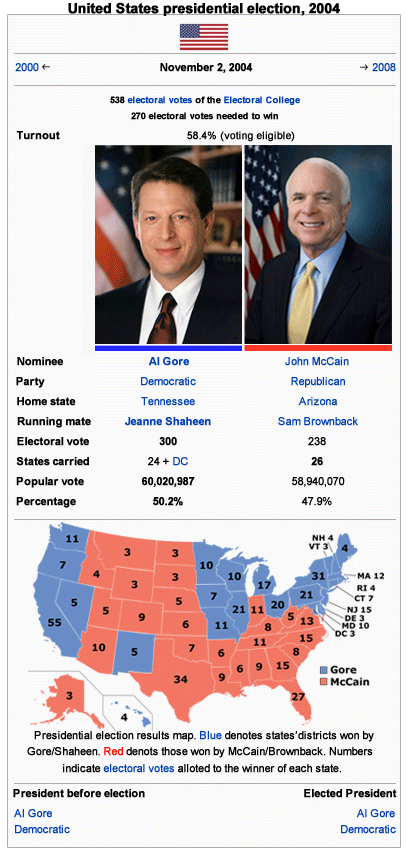Next in my series. Here's Canada's next election.
Following his loss in the 2006 federal election, Preston Manning resigned as Reform leader, after an astonishing nearly 20 years on the job. The candidates to replace him were all former Cabinet ministers, including Stephen Harper, Stockwell Day, Diane Ablonczy, Chuck Strahl, Monte Solberg, and Deborah Grey. Though Harper had entered the campaign as the frontrunner, he lacked charisma and soon faltered on the campaign trail. Day, though more controversial then Harper, was also more charismatic then Harper, which by the time the votes were cast allowed him to win a narrow victory.
Day initially boosted Reform's fortunes in the polls, with some indicating that Reform would be on track for their first ever majority government. Unfortunately for Day, his honeymoon didn't last long and Reform soon dropped in the polls. Sensing the perfect conditions for a majority government, Frank McKenna pulled the plug on his own government and forced an election.
On Election Day, it was clear that the Liberals would win re-election thanks to multiple gaffes made by Day. Pundits wondered, however, whether or not the Liberals would win a minority or majority government.

In the end, McKenna's Liberals won a majority government, bringing an end to the political instability that had plagued the country since the separation of Quebec. While Reform lost seats, so did the Progressive Conservatives under new leader Peter MacKay, who had been criticized for their continual support of the Liberal government. Though MacKay would stay on as PC leader, Day soon found himself forced out by a restless caucus.
Presidents of Quebec:
Jacques Parizeau (Parti Quebecois) 1996-2001
Lucien Bouchard (Parti Quebecois) 2001-2006
Louise Harel (Parti Quebecois) 2006-20XX
Prime Ministers of Quebec:
Lucien Bouchard (Parti Quebecois) 1996-2001
Pauline Marois (Parti Quebecois) 2001-2004
Martin Cauchon (Liberal) 2004-20XX
Prime Ministers of Canada:
Jean Chretien (Liberal) 1993-1997
Brian Tobin (Liberal) 1997-1998
Joe Clark (Progressive Conservative) 1998-2001
Preston Manning (Reform) 2001-2006
Frank McKenna (Liberal) 2006-20XX
Independent Quebec!
Quebec presidential election 1996 and Quebec legislative election 1996
Canadian federal election 1998
Quebec presidential election 2001 and Quebec legislative election 2000
Canadian federal election 2001
Canadian federal election 2003
Quebec legislative election 2004
Canadian federal election 2004
Quebec legislative election 2005
Canadian federal election 2006
Quebec presidential election 2006

Following his loss in the 2006 federal election, Preston Manning resigned as Reform leader, after an astonishing nearly 20 years on the job. The candidates to replace him were all former Cabinet ministers, including Stephen Harper, Stockwell Day, Diane Ablonczy, Chuck Strahl, Monte Solberg, and Deborah Grey. Though Harper had entered the campaign as the frontrunner, he lacked charisma and soon faltered on the campaign trail. Day, though more controversial then Harper, was also more charismatic then Harper, which by the time the votes were cast allowed him to win a narrow victory.
Day initially boosted Reform's fortunes in the polls, with some indicating that Reform would be on track for their first ever majority government. Unfortunately for Day, his honeymoon didn't last long and Reform soon dropped in the polls. Sensing the perfect conditions for a majority government, Frank McKenna pulled the plug on his own government and forced an election.
On Election Day, it was clear that the Liberals would win re-election thanks to multiple gaffes made by Day. Pundits wondered, however, whether or not the Liberals would win a minority or majority government.
In the end, McKenna's Liberals won a majority government, bringing an end to the political instability that had plagued the country since the separation of Quebec. While Reform lost seats, so did the Progressive Conservatives under new leader Peter MacKay, who had been criticized for their continual support of the Liberal government. Though MacKay would stay on as PC leader, Day soon found himself forced out by a restless caucus.
Presidents of Quebec:
Jacques Parizeau (Parti Quebecois) 1996-2001
Lucien Bouchard (Parti Quebecois) 2001-2006
Louise Harel (Parti Quebecois) 2006-20XX
Prime Ministers of Quebec:
Lucien Bouchard (Parti Quebecois) 1996-2001
Pauline Marois (Parti Quebecois) 2001-2004
Martin Cauchon (Liberal) 2004-20XX
Prime Ministers of Canada:
Jean Chretien (Liberal) 1993-1997
Brian Tobin (Liberal) 1997-1998
Joe Clark (Progressive Conservative) 1998-2001
Preston Manning (Reform) 2001-2006
Frank McKenna (Liberal) 2006-20XX
Independent Quebec!
Quebec presidential election 1996 and Quebec legislative election 1996
Canadian federal election 1998
Quebec presidential election 2001 and Quebec legislative election 2000
Canadian federal election 2001
Canadian federal election 2003
Quebec legislative election 2004
Canadian federal election 2004
Quebec legislative election 2005
Canadian federal election 2006
Quebec presidential election 2006







